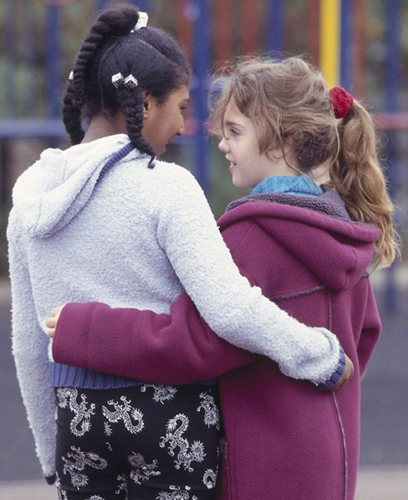| Q: |
She was top of the class. Why has my bright daughter stopped trying at school?
|
| A: |
There are many possible reasons your daughter’s performance has
changed; exploring these with her will help you pinpoint the problem.
The issue may be peer relationships: Perhaps her academic success makes
others look bad, or she’s constantly held up as a good example—a
“teacher’s pet”—which can cause resentment. The desire to belong to a
group of friends is strong, and your daughter may feel it is worth
dropping her grades in order to fit in and be liked.
Alternatively, she may
have found a peer group that encourages rebellion, and tasted the social
pay-off for becoming a rule breaker and neglecting her studies. Talk
with her about your concerns and try to re-ignite her interest in
studying by providing incentives for effort. Help her strengthen
friendships with others who share her love of learning, and make sure
she has time for fun and frivolous activities to balance her academic
work and serious side.
|
| Q: |
My daughter and her friends were caught stealing from a store. Can she be trusted again?
|
| A: |
Don’t despair—this doesn’t necessarily mean your daughter will
continue into a life of crime. Shoplifting is often carried out as a
dare, rewarded by the adrenaline rush after the event and the bond of a
guilty secret between friends. Tackle the issue without flying off the
handle. Try to involve the parents of your daughter’s friends to give a
strong message to all involved. Your child should never benefit from
stealing, so stolen items need to be returned to the store along with an
apology. This face-to-face encounter will emphasize the serious nature
of her actions and form the basis to rebuild trust.
|
| Q: |
My son’s best friend is the worst-behaved boy in his class. Can I get him to choose a nicer pal?
|
| A: |
Children are often drawn to friends we wouldn’t choose for them
as parents. However, most friendships are based on shared interests or
attitudes that create a positive bond. Rather than assuming the worst,
get to know this friend when he visits your home to play and try to
discover his positive qualities alongside his difficulties. Recognize
that your son could be at risk of getting caught up in troubles but,
equally, he may influence this friend to be better behaved instead.
However, if you notice a negative influence, for example your son
becoming disrespectful or adopting disagreeable behavior, you can weaken
the friendship by reducing the amount of time the two of them spend
together and actively invite different children to play. In school, try
asking teachers to pair your son with others for classroom tasks. Avoid
an outright ban on contact, since the rebellion of staying in touch can
simply cement the friendship.
|
| Q: |
How can I give him the confidence to say “no”?
|
| A: |
Increase your child’s resistance to peer pressure by building his
confidence to say “no” to hurtful or harmful suggestions. Children with
strong self-esteem are less likely to worry about losing a friend or
two through not going along with risky ideas. They’ll be confident that
their decision not to take part will be accepted or that other friends
will come along. However, be realistic: Your child will give in to peer
pressure sometimes. When this happens, talk openly about what worries
you, and use the opportunity to discuss the outcome of your child’s
decision, and what they could do differently next time.
|
| Q: |
My son says he will go barefoot if he doesn’t get Nike sneakers. Why is he being so unreasonable?
|
| A: |
This is entirely reasonable to your son: Being in the “right”
clothes can seem immensely important as he strives to be accepted and
even become one of the “cool” kids. If he’s determined to have the
Nikes, you may decide he has to save his pocket money to buy them.
Unfortunately, owning the brand probably won’t give him the status he
desires, but this is a lesson he may need to learn through experience.
For a different perspective, help him to separate the person from their
appearance by talking over the qualities he likes in his friends; try to
draw out the conclusion that it is their personality, humor, or
kindness that appeals, rather than what they’re wearing.
|
| Q: |
My daughter seems to be a tomboy. Should I discourage it?
|
| A: |
The label “tomboy” usually goes to the girls who are seen as
adventurous, play with toys and games more closely associated with boys,
and are not particularly concerned about their appearance. Far from
being seen as negative, young tomboys are popular and viewed as good
leaders. However, as girls move into adolescence, being a tomboy is less
well accepted by peers. By this stage, your child will be making her
own decisions about how she fits in, so it is probably inadvisable to
attempt to discourage this behavior. Tomboy behavior appears to come
from both biological and social factors. Research has found that if your
daughter is exposed to higher levels of testosterone in the womb, then
she will display more “masculine” interests and activities as a young
child. You will influence her behavior, too: If you praise and provide
opportunities for her varied pursuits, she’ll feel comfortable with this
aspect of her identity.
|
| Q: |
Why does my daughter want a bra when she doesn’t need one?
|
| A: |
Showing the physical signs of puberty can be a status symbol for
girls, and their first bra marks this change. While we may want our
children to enjoy the relative innocence of their childhood, they seem
determined to leave it behind as soon as possible. There is little
reason to say no to this request, whether your daughter physically needs
a bra or not. She may value your help to choose new underwear, so take
this as an opportunity for parent-child quality time, and guide her on
age-appropriate designs. At all costs, resist the temptation to joke
about her shape or size—this can be devastating to a girl sensitive
about her changing body.
|
| Q: |
My child wants to imitate her new friend’s vegetarianism. Is this simply a passing fad?
|
| A: |
Friends often copy each other, from the way they dress to the
music they prefer. This mirroring is stronger in the early phase of a
friendship. It is a way to strengthen the bond between children rather
than a sign of pressure to conform. The intensity of the need to match
each other should wear off as the relationship becomes firmer. In the
meantime, as long as requests are not too outrageous, you might as well
go along with them. The only caution comes if you feel your daughter is a
slave to her friends’ whims. Then you may need to help her develop
other, more balanced, relationships.
|
Collecting The latest craze
Like most boys in his class,
my son loves to be in on the latest thing, from baseball cards to crazy
bones. Collecting can get a bit out of hand with pressure to keep up
with friends and anxiety about completing a set. I’ve found it helps to
set a limit of one collection at a time and encourage my son to complete
that collection before going on to another. He uses his pocket money to
buy more cards then swaps with friends, which gives him a little more
flexibility. I put in some extra supervision to prevent swapping from
descending into one-upmanship.
How children play at this age An evolving pastime
Friendships are
becoming more important to your child as his interest grows to include
not just playing and having fun, but also why his friends think and act
the way they do. You will still be his strongest influence, but he will
care about how his friends view him, his home, and his family.
New technology
Your child’s play
will be evolving along with the technology he uses. He will organize to
meet friends through texting and instant messaging so getting together
can be more spontaneous. His indoor play, alone or with friends, may
revolve around a games console or computer rather than a box of Lego and
board games, although he won’t have wholly let go of these traditional
activities. His competitive spirit will probably come through no matter
what game he plays. Helping him get the balance of indoor and outdoor,
physical and quiet play that he needs may be your role. Playing isn’t
just for your child. When you participate, either by watching or by
playing with him, and especially if he’s teaching you the latest game,
you’re getting to know his changing interests and friends.
Difference between sexes
Both boys and girls tend
to develop a few close friendships, but your son is likely to prefer
playing in a large group and enjoy teams and competitions. In contrast,
girls will often have less boisterous play and may spend their time in
smaller groups with one or two best friends. Your son, when asked what
he thinks of girls, is quite likely to say “yuck” and make a face. He
will play primarily with children of the same gender. He may be teased
if he plays with girls, and it’s much less common that he’ll do so.
By comparison, your
daughter at this age is more willing and comfortable to join in with the
boys, although she too, will most often be with her female friends.
One of the boys
At this age, boys are likely to stick together, away from the girls.

Me and you
Girls tend to spend their time in smaller groups with one or two closer friends.

Peaceful scene
As well as outdoor, physical play, help your child enjoy quiet activities.
